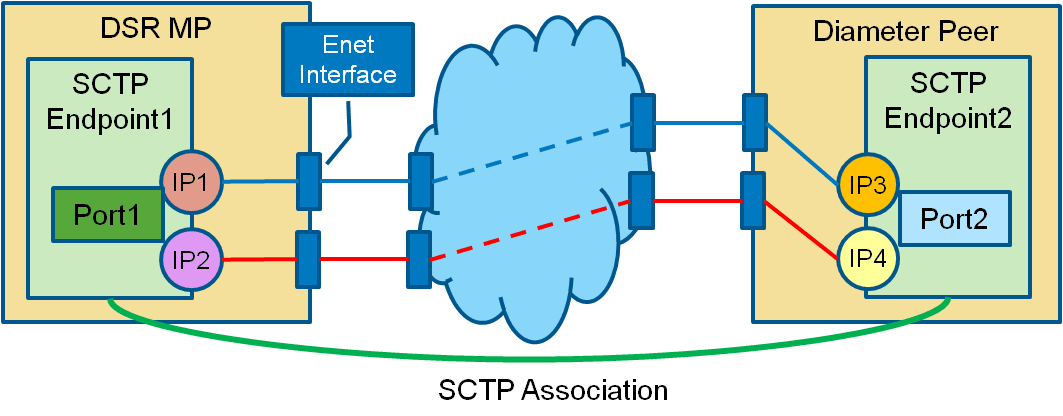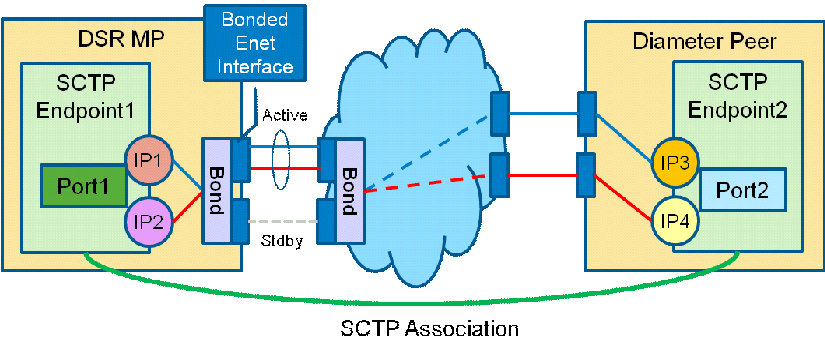2.6.5 Transport
The DSR supports SCTP and TCP transport simultaneously including support for both protocols to the same Diameter peer. The DSR supports UDP transport for Radius. The DSR supports up to 64 connections per single Diameter peer which can either be uni-homed via TCP or SCTP or multi-homed via SCTP. The DSR maintains the availability status of each Diameter peer. Supported values are available, unavailable and degraded.
The following information are some of the configurable items for each connection:
- Peer Host FQDN, Realm ID and optionally IPv4 or IPv6 address.
- Local Host and Realm ID (defined as part of the Diameter node).
- Message Priority Configuration Set.
- Egress Throttling Configuration Set.
- Remote Busy Usage / Remote Busy Abatement Timer.
- Transport Congestion Abatement Time-out.
- DSR Local Node status as the connection initiator only, initiator & responder (default) or responder-only.
- Other connection characteristics such as timer values detailed below.
-
For SCTP connections:
- RTO.Initial
- RTO.Min
- RTO.Max
- RTO.Max.Init
- Association.Max.Retrans
- Path.Max.Retrans
- Max.Init.Retrans
- HB.Interval
- SACK Delay
- Maximum number of Inbound and Outbound Streams
- Partial Reliability Lifetime
- Socket Send/Rx Buffer
- Max Burst
- Datagram Bundling
- Maximum Segment Size
- Fragmentation Flag
- Data Chunk Delivery Flag
For TCP connections:
- Nagle Algorithm ON/OFF indicator.
- Socket Send/Rx Buffer.
- Maximum Segment Size (bytes).
- TCP Keep Alive.
- TCP Idle Time For Keep Alive.
- TCP Probe Interval For Keep Alive.
- TCP Keep Alive Max Count.
- Diameter Connect Timer (Tc as per RFC6733).
- Diameter Watchdog Timer Initial value (as per RFC3539).
- Diameter Capabilities Exchange Timer (Oracle extension to RFC6733).
- Diameter Disconnect Timer (Oracle extension to RFC6733).
- Diameter Proving Mode (Oracle extension to RFC3539).
- Diameter Proving Timer (Oracle extension to RFC3539).
- Diameter Proving Times (Oracle extension to RFC3539).
DSR supports multiple SCTP streams as follows:
- DSR negotiates the number of SCTP inbound and outbound streams with peers per RFC4960 during connection establishment using the number of streams configured for the connection.
- DSR sends CER, CEA, DPR, and DPA messages on outbound stream 0/
- If stream negotiation results in more than 1 outbound stream toward a peer, DSR evenly distributes DWR, DWA, Request, and Answer messages across non-zero outbound streams.
- DSR accepts and processes messages from the peer on any valid inbound stream.
The DSR supports SCTP multi-homing as an option which provides a level of fault tolerance against IP network failures. By implementing multi-homing the DSR can establish an alternate path to the Diameter peers it connects to through the IP network using SCTP protocol. Failure of the primary network path will result in the DSR re-routing Diameter messages through the configured alternate IP path. Multi-homed associations can be created through multiple IP interfaces on a single MP blade. This is independent of any port bonding existing on the Ethernet interfaces. Multi-homing is supported for both IPv4 and IPv6 networks but IPv4 and IPv6 cannot co-exist on the same connection.
Figure 2-11 SCTP Multi-Homing

Figure 2-12 SCTP Multi-Homing via Port Bonding
